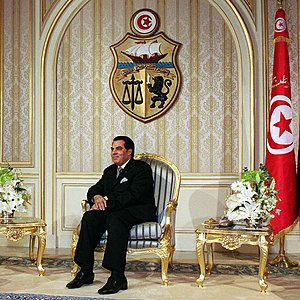Ellen Knickerbocker:
When security forces started firing on protestors earlier this month on the streets of cities around Tunisia, the military stepped in. President Zine el-Abidine Ben Ali's orders were to make the protests end, with live rounds if needed. The armed forces didn't listen. Troops moved into the streets and reportedly even deployed helicopters to stop paramilitary snipers who were shooting demonstrators from rooftops. The de facto head of the military, Army Chief of Staff Gen. Rachid Ammar, then prodded President Zine al-Abidine Ben Ali into exile, saved the people's revolution, and -- most miraculously of all -- then declined to take power himself.
Tonight in Cairo, where armed personnel carriers and tanks can be seen patrolling the streets to enforce President Hosni Mubarak's curfew, Egyptian protesters may be wishing they were so lucky. The reactions of national militaries often determine whether a popular revolution lives or dies. And the armed forces of Egypt, Tunisia, and Yemen -- three countries where stunning public uprisings are challenging the existing order this week -- couldn't be more different. Among the three, Tunisia's small, professional force stands out as the exception, not just for its quality but for its separation from an entrenched, autocratic regime.
Long before protestors took to the streets late in 2010, the Tunisian military was unusual among its regional peers. First, unlike the bloated militaries of other Middle Eastern states, Tunisia's soldiers wouldn't fill the seats of most American college football stadiums. They are an enigma both to the Tunisian people and to the country's allies; the military often resists foreign aid, scoffing at such patronizing treatment. U.S. military officials told me Tunisia's armed forces had already canceled half the training exercises they had scheduled with the United States for 2011 because, frankly, the Tunisians couldn't be bothered. For the moment, the military is slated to get all of $4.9 million in U.S. military aid this year.
Then there is Egypt's military, which takes in about 260 times as much U.S. military aid -- an incredible $1.3 billion annually. That money means that, in many ways, the armed forces rule Egypt, says analyst Daniel Brumberg at the U.S. Institute for Peace. Mubarak, himself a former Air Force commander, has deftly used American taxpayers' dollars to underpin not just the military but his entire government. Egyptian generals are a privileged elite, enjoying weekends and retirements in breezy villas by the sea. They make clear that they expect a say in who rules the Arab world's most populous country once Mubarak leaves the scene. Keeping the U.S. military aid flowing dominates Mubarak's foreign policy, defined first and foremost in the region by its cold peace with Israel. After all, the annual influx of U.S. military aid ranks up there with tourism and Suez Canal tolls as Egypt's main sources of revenue.
...
This suggest the Egyptian army is not likely to allow a radical group like the Egyptian Brotherhood to steal the revolution. It is also unlikely to let the people do so either. We should be looking at who they will put forward to replace Mubarak.
 Image via Wikipedia
Image via Wikipedia
Comments
Post a Comment